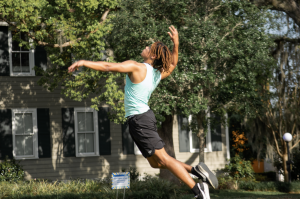The Rollins College Conference, or RCC, is an important part of the Rollins tradition for incoming students. This is an integrated program in which all freshman and transfer students are enrolled, and is not only a significant aspect of orientation, but it is also a seminar class that takes place during the fall semester.
The RCC is comprised of a professor and generally one or two peer mentors. These peer mentors are upperclassmen. For freshman students, the purpose of these seminars is to explore a topic in the professor’s area of expertise. The professor that runs the RCC also serves as the student’s faculty advisor, establishing a firm academic relationship. These classes will typically meet three times a week in the morning on Monday, Wednesday, and Fridays. It is not only an educational experience, but a personal one as well–a way to meet new people and develop social and communication skills. The entire experience is meant to help freshman students get accustomed to the college way of life and academics.
The RCC for transfer students is a bit different and focuses on getting the new students accustomed to Rollins and integrated into the Rollins community. Unlike their freshman counterparts, these RCC classes only meet once a week. Although academic topics are not discussed in depth, the transfer RCC is no less important than the freshman one. It is meant to truly help facilitate the often awkward transfer transition into Rollins College.
There is a wide selection of different and unique RCC classes offered, ranging from ‘Medical Ethics’ and ‘German on the Fast Track’ to ‘Deus Ex Machina: Social Evolution in Virtual Worlds’. It’s unsurprising that many may wonder how these topics might be selected; after all, students are placed in a selection of over thirty classes, each with their own idiosyncratic focus.
It might come as a shock that there is an actual art behind choosing the RCC topics. Gabriel Barreneche, the coordinator of the RCC program, offered some insight to the process of choosing RCC professors, by stating, “At the start of the spring semester, a call goes out to all of the faculty asking for volunteers to teach in the RCC program. Departments and individual faculty respond indicating their interest in participating, and usually everyone who wants to teach the RCC can.”
Clearly, there is a wide interest among the faculty of Rollins to teach the RCC classes. Professors individually select RCC topics based on their area of expertise and/or interest–which explains the diverse selection of topics. After a topic is chosen, it is the responsibility of the professor to create a course that is not only discussion-based, but additionally enable what Barreneche calls “student-centered learning”. It’s not simply up to the professors, however; the RCC faculty director has the final say on whether each proposed class is suitable for the year’s RCC program.
The process of selecting the RCC topics shows that each course is given an impressive amount of thought and is tailored to each professor’s area of expertise. As a whole, it shows that the Rollins College Conference is no ‘cookie-cutter’ transition program; it is a distinctive academic experience for all who participate.







Be First to Comment